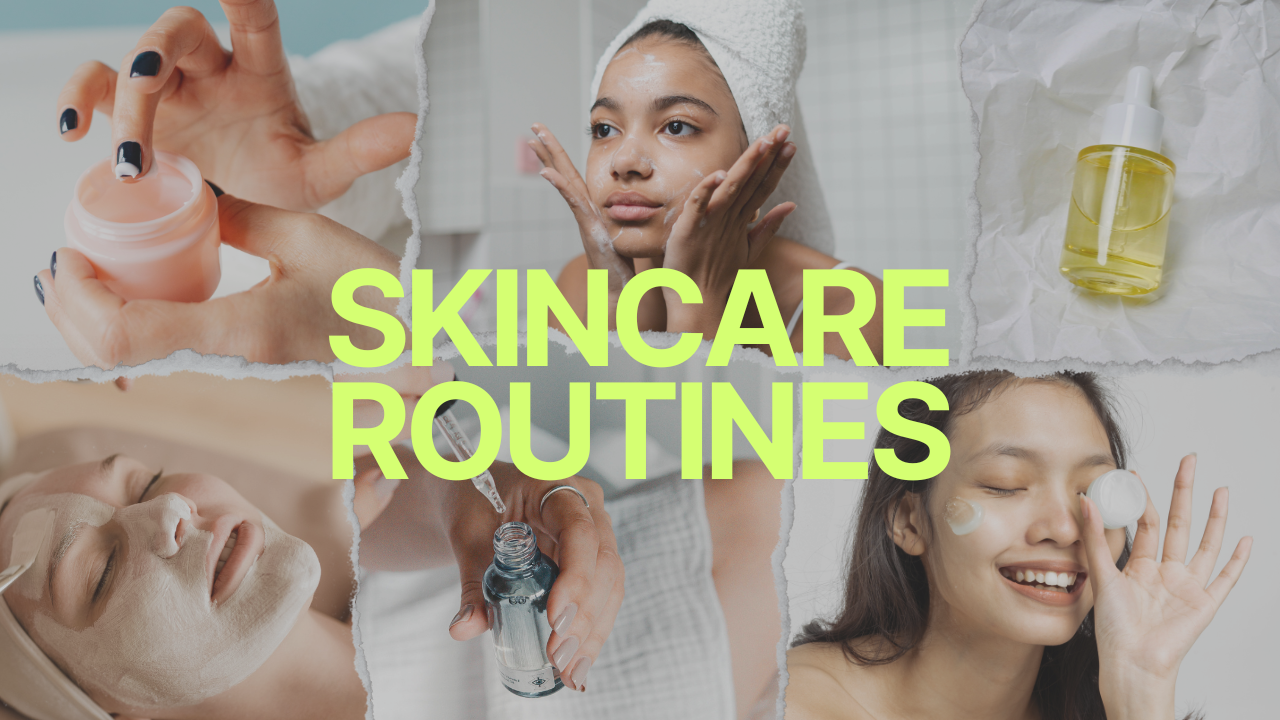The path to radiant, healthy skin can seem irresistible when it comes to skincare regimens. Knowing where to begin is crucial because there are so many goods and tips available. We’ll abridge the basics of skincare routines in this post so you can easily design a program that suits your specific skin type.
Knowing Your Skin Type
Determining your skin type is essential before beginning any particular practice. The primary classifications are:
Normal: Not too wet or too greasy.
Oily: Shiny, prone to acne, with enlarged pores.
Dry: Tight, flaky, and possibly abrasive.
Combination: A blend of dry and greasy patches.
Sensitive: Easily agitated, frequently itchy or red.
Understanding your skin type aids in product selection, assuring the effectiveness of your skincare regimen.
The Important Steps in a Skincare Program
The five main components of a basic skincare regimen are typically washing, toning, treating, moisturizing, and adding sunscreen. Let’s dissect each stage.
1.Cleaning: Make a New Start
The first step in any skincare regimen is cleansing. It lets your skin breathe by removing oil, debris, and makeup. Choose a mild cleanser that won’t reduce your skin’s natural oils if you have dry or normal skin. Consider using a frothy or gel cleanser to manage extra oil if you have oily skin.
Advice: To uphold the freshness of your skin, wash twice a day, once in the morning and once before bed.
2.Toning: Maintain Skin Equilibrium
The pH balance of your skin can be reinstated by using a toner after purgative. Any remaining contaminants can also be remove using toners. Look for moisturizing toners with glycerin or same components if your skin is dry. Witch hazel and other toners with harsh qualities may be helpful for oily skin types.
3.Addressing: Focus on Particular Issues
It’s time to deal with particular skin conditions now. Treatments like serums and advertisement actions are your best friends whether you have fine wrinkles, black spots, or acne. For example, a salicylic acid-containing serum may work good for skin that is willing to to acne. Look for products that contain vitamin C or hyaluronic acid if you’re worried about aging.
4. Hydrating: Reservation Hydration
Despite having oily skin, moisturizing is crucial. A quality moisturizer can help balance oil production and keep your skin hydrated. A lighter gel or lotion may be favored by people with oily skin, while a thicker cream is best for those with thirsty skin.
Advice: To correctly closure in moisture, always apply a conditioner when your skin is still damp.
5. Use Sunscreen to Keep Your Skin Harmless
Lastly, always wear sunscreen throughout the day. UV radiation can principal to skin cancer and early aging. If you’re outside, reapply your sunscreen every two hours and go for a broad-range SPF of at least 30. It’s important to protect your skin, even on overcast days.
Personalizing Your Daily Routine
Although the fundamental actions listed above are universal, you can alter your regimen to suit the requirements of your skin. For instance, think around incorporating an exfoliation into your daily regimen once or double a week. Exfoliation leaves your skin smooth and glowing by removing dead skin cells.
Selecting Appropriate Items
Pay close attention to labels when choosing skincare products. Steer clear of harsh chemicals that can irritate your skin and look for substances that are appropriate for your skin type. spot-test a product on a tiny spot of skin if you’re not convinced about it.

Concluding remarks
To sum up, creating a skincare regimen doesn’t have to be difficult. You may attain healthy, radiant skin by knowing your skin type and following the simple instructions. Keep in mind that listening to your skin will help you along the way, and consistency is essential. Enjoy the self-care, embrace the process, and see how your skin improves!
FAQS
1.How frequently should my skincare regimen be altered?
Generally speaking, it’s best to maintain a skincare regimen for four to six weeks before modifying it. Your skin will have more time to adapt and produce results as a result. It’s best to reconsider and make changes sooner rather than later, though, if you feel irritated or have a bad reaction.
2.Is it likely to use more than one product at once?
Yes, you can use more than one product, but it’s vital to properly layer them. Start with the reediest product and work your way up to the thickest (e.g., serum, then moisturizer). Additionally, using too many active chemicals at once can annoy the skin.
3. Does a toner have to be used?
Toners can be helpful, but they are not necessary for everyone. They aid in clearing away any remaining contaminants and prime the skin for improved product absorption. You can omit this step if your skin feels OK without it.
4.How can I pick the ideal sunscreen?
Choose a sunscreen with a broad-spectrum arrangement that offers defense from UVA and UVB radiation. It is advised to use an SPF of at least 30. Think about your skin type: a gel or dull product might work best for oily skin, while a cream-based sunscreen might be more appropriate for dry skin.
5. How should myself proceed if my skin is sensitive?
Choose goods that are labeled “fragrance-free” or “hypoallergenic” if you have subtle skin. To less irritation, use mild cleansers and moisturizers and conduct patch testing before to presenting new products.
6.Can my skin be pretentious by my diet?
Of course! Skin health can be improved by eating a balanced diet full of fruits, vegetables, and good fats. Drink lots of water since it’s vital to stay hydrated. Vitamins, omega-3 fatty acids, and antioxidant-rich foods are particularly good for custody skin healthy.
7. How can I properly cure acne?
Look for products that contain retinoids, benzoyl peroxide, or salicylic acid to cure acne. Harsh scrubs should be avoided because they can cause skin irritation. Consider finding adapted leadership from a dermatologist if over-the-counter remedies prove ineffective.

